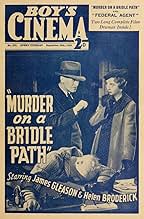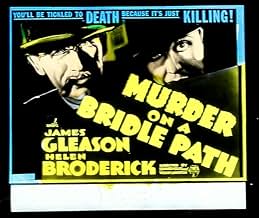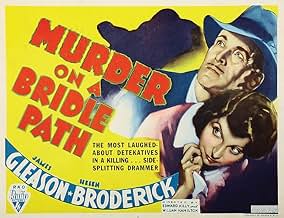After Hildegarde proves that the accidental riding death on a Central Park bridle path is really murder, she's faced with a plethora of red herrings and a real killer.After Hildegarde proves that the accidental riding death on a Central Park bridle path is really murder, she's faced with a plethora of red herrings and a real killer.After Hildegarde proves that the accidental riding death on a Central Park bridle path is really murder, she's faced with a plethora of red herrings and a real killer.
- Taxi Driver
- (uncredited)
- Pipe Expert
- (uncredited)
Featured reviews
A somewhat unconvincing murder mystery that is still fun to watch unfold.
Murder on a bridle path
Helen Broderick gives Hildegard a very different slant than did Edna May Oliver - she's more energetic and even more sharp tongued with plenty of great one liners, but I miss Oliver whose arched expressions of dismay at the police stupidity; I loved her voice, too. But Broderick does her best and comes across being on the ball. It's a good mystery, plenty to be puzzled over till the case is solved.
You'll like this one better if ...
In this entry in the series, a pretty but difficult young woman makes enemies of everyone around her, although we're told about this more than we see it - the girl barely gets more than a scene before she is murdered while riding her horse one morning. Only the homicide investigation turns up the most likely suspect - a rich ex-husband who was a husband in the first place only because the murdered woman wanted a big payoff in the form of alimony. Piper thinks he's on to something until he learns that the man in question was in jail for non payment of alimony at the time, and that the man's only close living relative, his father, who also hates the girl for what she has done to his son, is an invalid incapable of traipsing around parks early in the morning. There are other numerous less likely suspects introduced just to keep you guessing.
As usual, Hildegarde out-sleuths Piper at several key junctures, but she also makes a key miscalculation that leads up to a big joke at her expense in the last scene, after the mystery is solved. The fact that this one word - applesauce - could ever have been considered a curse word of sorts may seem strange to modern audiences. Stranger still was that the production code was so sensitive at the time that the film had to make the retort to Hildegarde appear to have two meanings.
This one is an above average mystery and well acted, just don't expect the magic of the ones with both Gleason and Oliver starring.
WAS IT THE HORSE OR THE BIG BAD WOLF?
I do agree with the last reviewer that if you had NOT seen the earlier films starring Oliver, you would have apprecaited this entry even more. It's not all that bad, and even a tad creepy in spots, however Broderick's portrayal of the clever female detective is not the same as Olivers. While the latter employed wise-cracks and priceless frowns, Helen Broderick appears more calculating, seemingly taking mental notes of suspects, and strangely appears to have less dialogue. At times she is over-shadowed by detective James Gleason, who supplies all the one liners. Broderick, a very good actress in her own right, looks the part, but you are definitely thinking Edna May Oliver.
Still, it's an interesting late night mystery, all about an unpopular socialite who takes a horse ride --and never comes back. It will definitely keep you guessing (many suspects at large), and the suspenseful ending was exceptionally written. This is perhaps Broderick's best scene. Also, the supporting cast is very good. Comedian Zasu Pitts took over the lead in the next entry. This is in a super dvd box set of Hildegard Withers mysteries, not to be missed.
A new Miss Withers is still quite sharp
This is, indeed, the fourth murder case on which Miss Withers assists, critiques, leads, follows, and just generally offers suggestions to her crusty detective friend. James Gleason's Oscar Piper is once again easily chagrined but grudgingly respectful of Miss Withers' detecting skills; Helen Broderick takes on the role of school teacher and amateur sleuth Hildegarde Withers for the first and only time. This Withers is a bit less tart and somewhat more conscious of her own wittiness than the earlier Withers (as portrayed by Edna May Oliver). Broderick and Gleason quickly establish a rapport and relationship that—as in the earlier films in the series—is easily our primary reason for watching.
The plot involves the death of society girl Violet Feveral, played (albeit briefly) with delicious nastiness by Sheila Terry. Suspects abound—this Violet was, in the best whodunit tradition, wildly unpopular and had handed out insults and injuries to numerous other characters in the hours and days before her death. The familiar faces in the lineup of suspects include Louise Latimer as a sister to the victim; John Carroll as a family employee; and Leslie Fenton, who is quite good as the nervous ex-husband who has just been mysteriously released from jail. Willie Best stands out in his usual thankless role as a stable boy who may have a clue or two; his deadpan delivery when answering questions (What was he doing in jail? "Shooting craps." No, what was he in jail for? "Shooting craps.") squeezes the maximum out of a role that's otherwise a lame stereotype.
The mystery itself is not particularly inventive or suspenseful; however, the story moves along briskly and the actors and script are competent if not brilliant. The interaction between Gleason and Broderick is clearly presented as the center of the picture—and that relationship between a couple of pros is a lot of fun to watch. (One example: Oscar suggests that the murder was a "crime of passion," to which Hildegarde snaps, "Oscar, don't you think we'd better try to keep this case clean?")
Bonus: we are instructed what can be learned about a person from examining his pipe!
Did you know
- TriviaAlthough this is the first and only time Helen Broderick played Hildegarde Withers in the six picture series, James Gleason played Inspector Oscar Piper in all of them.
- GoofsWhen Hildegard is looking through the telescope, the field of view follows the horse running around the track, yet she doesn't move the telescope.
- Quotes
Hildegarde Withers: How long have you worked around here?
'High-Pockets': About three months, Ma'am... not countin' the week I was in jail.
Hildegarde Withers: What were you doing in jail?
'High-Pockets': Shootin' craps.
Hildegarde Withers: No, I mean what did they put you in jail for?
'High-Pockets': Shootin' craps.
- ConnectionsFollowed by The Plot Thickens (1936)
Details
- Release date
- Country of origin
- Language
- Also known as
- The Puzzle of the Briar Pipe
- Filming locations
- Production company
- See more company credits at IMDbPro
- Runtime
- 1h 6m(66 min)
- Color
- Aspect ratio
- 1.37 : 1



































